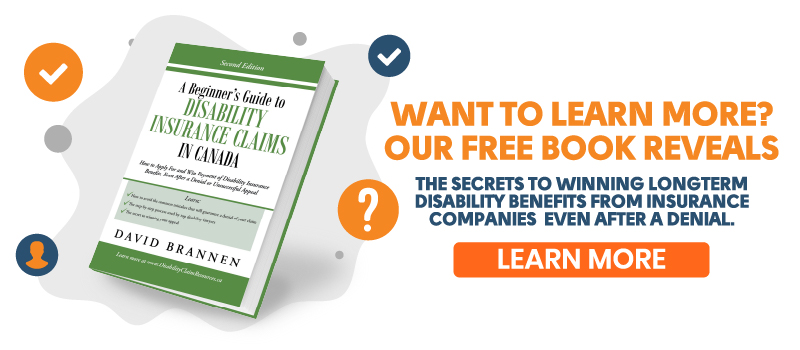Insurance companies frequently conduct video, audio and online surveillance of people who have applied for long-term disability benefits. This surveillance is done without your knowledge or consent. After reading this guide, you will understand how surveillance works in long-term disability claims. You will also know your rights and the rules insurance companies must follow.
This article is based on my 17 years of experience as a lawyer representing people in long-term disability claims. During that time, I have seen hundreds of examples of insurance-based surveillance. This article was co-authored with Jen Shea, Resolute Legal’s support team manager.
This article is part of our Ultimate Guide to Long-Term Disability in Canada.
What is Long-Term Disability Surveillance?
Generally speaking, surveillance is the monitoring of behaviour, information and activities for the purpose of gathering information necessary to make decisions. It can include observation from a distance by means of electronic equipment such as cameras and recorders. However, it can also involve online monitoring and several other technical methods. In most cases, surveillance is done without the knowledge or consent of the person being watched.
When most people think of surveillance, they picture the police putting a wiretap on a suspected criminal. But surveillance can extend to a variety of different agencies and people. For instance, insurance companies can conduct surveillance on long-term disability claimants. This is called long-term disability surveillance. Insurance companies frequently use surveillance as evidence to justify their decision to deny a claim for long-term disability payments. Long-term disability surveillance often includes video, audio, and online surveillance.
Why Do Insurance Companies Conduct Long-Term Disability Surveillance?
The short answer is that it helps them deny insurance claims. When all else fails, surveillance evidence can justify stopping your long-term disability benefits — even when the medical evidence supports approval of your claim.
With many long-term disability claims, the approval of benefits hinges on the credibility or believability of the claimant. It is hard to win any legal case if a client has poor credibility or is not believable. Surveillance evidence can strike at the heart of your credibility. Even honest inconsistencies can hurt your credibility and make it hard to win a legitimate claim.
Therefore, the insurer’s ultimate goal is to raise doubts about your credibility and believability. They do this by creating inconsistencies with your prior statements. A common tactic I’ve seen is the insurance company will send you a form asking about your ability to do certain activities. If you check the box that says “I no longer do yard work,” the insurance company will try to get a video of you doing yard work. If successful, they would say they have caught you in a lie. And if you are lying about doing yard work, then they will say you are lying about everything.
I once advised a person in this exact situation. He had indicated on a questionnaire that he no longer did yard work. But upon further questioning from me, we determined that he did help his son do the yard work. He would help him get the lawn mower out and assist with small tasks while his son did the rest. In his mind, he couldn’t do all the yard work on his own; therefore, he checked the box saying he could no longer do yard work. However, if the insurance company got a video of him helping his son, they would accuse him of lying. And quite possibly, they could have used this inconsistency as ammunition to deny his claim.
So, simply put, the goal of long-term disability surveillance is to do just that: they want to catch you in a lie so they can deny your claim.
What Laws Govern Long-Term Disability Surveillance by Insurance Companies in Canada?
Long-term disability surveillance is governed by Personal Information Protection laws. These laws cover the collection of personal information by businesses, which includes surveillance activities.
The law that applies to you will depend on where the surveillance was conducted (i.e., what province). For example, if you live in Ontario, insurance company surveillance is governed by The Personal Information Protection and Electronic Documents Act (PIPEDIA). The following is a complete list of the laws by province:
| Province | Law |
|---|---|
| Ontario, Manitoba, New Brunswick, Newfoundland & Labrador, Nova Scotia, Prince Edward Island, Saskatchewan, Nunavut, Northwest Territories, Yukon | The Personal Information Protection and Electronic Documents Act |
| British Columbia | Personal Information Protection Act (British Columbia) |
| Alberta | Personal Information Protection Act (Alberta) |
| Quebec | Act Respecting the Protection of Personal Information in the Private Sector (Quebec) |
How Is It Legal For an Insurance Company to Do Surveillance Without the Person’s Knowledge and Consent?
The Personal Information Protection (PIP) laws (see above) make it illegal for companies to collect, use, or disclose your personal information without your knowledge or consent.
For example, here is how it is worded in the PIPEDA:
4.3 Principle 3 – Consent
The knowledge and consent of the individual are required for the collection , use, or disclosure of personal information.
So, you may wonder, how is it legal for the insurance company to do surveillance without your consent?
The answer is that PIP laws have an exception for investigations related to a potential breach of contract.
Here is how this exception is worded in the PIPEDA:
Collection without knowledge or consent
7(1) For the purpose of clause 4.3 of schedule 1…an organization may collect personal information without the consent of the individual only if
(b) it is reasonable to expect that the collection with the knowledge or consent of the individual would compromise the availability or accuracy of the information and the collection is reasonable for purposes related to investigating a breach of an agreement or a contravention of the laws of Canada or a province;
So, if an insurance company has reasonable grounds to believe a disability claimant is being dishonest, then the insurance company can conduct surveillance without the knowledge or consent of the person.
What Are the Limits on Insurance Companies Doing Surveillance?
There are limits on when and how insurance companies can do surveillance without a person’s consent. Here are a few worth noting.
Surveillance is limited to public spaces
First, the insurance company can only watch and record you in or from public spaces. Or from any place where you do not have a reasonable expectation of privacy. Most video surveillance is done from a car parked along the road by your house or apartment. It can also be conducted by following you in stores or other spaces open to the public.
They need “substantial evidence”
Second, insurance companies can only do surveillance when they have “substantial evidence” that you are being dishonest about your disability claim. They need evidence of dishonesty before they can do surveillance. Or, at the very least, they need evidence of inconsistencies in the statements you have given them. For example, if you told the insurance company you aren’t doing any work, but they see on Facebook that you are running a dance class and recently registered a business name related to dancing, this could justify them doing surveillance.
They need to use less privacy-invasive methods before doing surveillance
Third, before conducting surveillance, the insurance company must have exhausted all other means to collect the information without invading your privacy. This means this insurance company has to do things like interviewing you over the phone, asking you to fill out questionnaires, reviewing your medical records, or sending you in for a medical assessment. Many insurance companies run afoul of this requirement when doing surveillance. They can’t show that they used less privacy-invasive means to get the information.
Surveillance must be as limited as possible
Finally, the insurance company’s collection of personal information without consent must be as limited as possible. The insurance company must refrain from doing excessive hours of surveillance unless it is justified. For example, the insurance company may be justified in doing an initial three days of surveillance. However, if the information collected does not show dishonesty or, worse yet, supports what you have told them. Then they are not justified in continuing to do more surveillance in the hope of finding something. They are not allowed to use surveillance as a fishing expedition.
When is Long-Term Disability Surveillance Most Likely?
Surveillance can happen at any time during a long-term disability claim. However, the following are situations when surveillance is most likely.
Whenever there are red flags (from the insurance company’s perspective)
Surveillance can happen when the insurance company senses you are being dishonest with them. In other words, whenever they see a red flag. They see red flags when you give inconsistent statements. Or when they discover information that contradicts what you have told them.
In the lead-up to the change of definition of disability
The change of definition usually occurs after two or three years of receiving long-term disability benefits. The definition of disability changes from being unable to do your “own occupation” to being unable to do “any occupation.”
It is harder for you to show that you can’t do “any” occupation than it is to show you can’t do your “own” occupation. For example, it is easier for me to prove a disability prevents me from being a lawyer (my own occupation), but it would be harder to prove I can’t do other occupations that are less stressful or difficult.
Therefore, it is common for insurance companies to do surveillance in the year leading up to the date of the change of definition. Their goal is to get a video showing you doing things that are consistent with you being able to do some other type of work.
On days when you have medical appointments
Insurance companies like to do surveillance on days you attend medical appointments. This can be appointments with your own doctors or treating professionals. Or it can be when you attend medical assessments or treatment arranged by the insurance company.
Insurance companies like to do surveillance before or after medical appointments for a few reasons.
First, if they know you have the appointment, then they know you will be leaving the house that day. They don’t have to risk having an investigator sit outside of your house for days waiting for you to leave randomly.
Second, they have a chance to get the best evidence of inconsistencies. When you attend medical appointments, you talk to the providers about how you are doing, your limitations, etc. If the insurance company gets a video of you before and after the appointment, they can then cross reference the video with what you told the medical provider. They will look for inconsistencies from what you said you could do at the appointment with video evidence taken from the same day you made those statements. Many people will run errands after going to a medical appointment, so they will follow you around to get a video of you doing more activity than you said you could do.
Third, it allows them to hedge their bets. For example, let’s say you attend a medical examination with a doctor hired by the insurance company. And the doctor gives a report that is favourable to you (yes, it does happen). The insurance company does not want to get stuck with a report like that because they will have to approve your benefits.
Now, let’s suppose the insurance company did surveillance of you on the day you attended that appointment. And the video shows some inconsistencies in what you told the doctor and what is on the video. The insurance company can send that video to the doctor and ask if it changes their opinion. In some cases, the doctor will flip and say yes, it does. And the favourable report transforms into one where the doctor calls you dishonest. On the other hand, if the original doctor’s report was favourable to the insurance company. They won’t show the surveillance to the doctor, especially if doing so would have been beneficial for you.
Before or after the insurance company asks you to complete an activities questionnaire
If your insurer has sent you an activities form to fill out, chances are they have you under surveillance already or are planning to in the near future.
Our advice is to fill out the form as honestly as possible. Think about your entire range of activities over the past year. Give examples of both good days and bad days. People run into problems when they only indicate their abilities on their worst days. This is because the insurance company compares what you say you can do with what they see you doing in their surveillance. By being honest with them and documenting what you’re capable of on your good days, they won’t be able to catch you in a lie.
You also must be very careful and transparent with your language. We’ve had a client answer the question, “How often do you leave the house?” by checking a box that said “Rarely.” The insurance company got her on video leaving the house five times in one week. They used that as a reason to stop her benefits based on fraud or deception.
Even if they were five minor outings, in this situation, it does appear that checking “Rarely” would have been a lie. That is why it’s important to be clear and honest.
When you have been on an approved claim for many years
Suppose you have been on long-term disability benefits for several years. Your medical evidence hasn’t changed, and you haven’t shown any signs of improvement. In this situation, the insurance company has no valid reason to cut you off.
So, instead of leaving you be, some insurance companies will turn to surveillance to try and dig up evidence to justify a termination of benefits. The most common approach is for them to do surveillance before and after sending you an activities questionnaire (see above).
Long-term Disability Surveillance Frequently Asked Questions
Can they shoot a video looking into my house?
Private investigators must survey you from a public space. They also can’t watch and record you in situations where you have a reasonable expectation of privacy.
However, recording people through windows is a grey area. For example, suppose you are inside your house but are visible through windows facing a public road. In that case, you likely don’t have an expectation of privacy because anyone passing by your home can see you. Therefore, a private investigator could be justified in taking the video.
Is long-term disability surveillance harassment?
In Canada, harassment is defined as unwanted physical or verbal behaviour that offends or humiliates you. Surveillance is only considered harassment if they break privacy laws. For example, it is illegal for private investigators to use listening devices to record you, go on your personal property to approach you, or enter your home. However, following you to shopping centres or watching you outside our home would not be considered harassment.
Should I confront the surveillance people?
Please don’t try to confront the people performing surveillance on you; you won’t gain anything. They are usually within their legal rights to be surveilling you in public places and are just doing their job. In 99.9% of cases, they won’t stop the surveillance just because you approach them. Confronting them can reflect poorly on you. If you are emotional, aggravated, or aggressive, it will only look bad on you.
Can I call the police?
Of course, you can call the police if you feel uncomfortable with the private investigator’s surveillance. But truthfully, they won’t do much. Typically they will tell you that the person is a private investigator and, as long as they are in a public space is within their rights to be watching you. There isn’t much the cops can do otherwise.
Can they perform long-term disability surveillance on my social media accounts?
Typically, if you are under surveillance, it will include both your physical life and your presence online. For example, they can look at your photos and videos online, groups you may post on, social sales, and pages for volunteer work.
The best way to prevent this type of surveillance is simply by adjusting your privacy settings. Most social media sites allow you to control who can follow you or see what you post.
They may also do some general online surveillance. This can include broad searches for known emails and phone numbers to see what comes up, searching public registries looking for registered businesses and searching through court records to see if your name appears in any lawsuits.
Suppose you’re trying to do any social selling of products or crafts online. In that case, you should always inform the insurance company that you’re doing so.
Next Steps
If you suspect that you’re under surveillance and want to know for sure, you can request your disability claim file from your insurer. This file will tell you if you are under surveillance or not.
However, if you are concerned about getting cut off due to surveillance, we highly recommend getting in contact with a lawyer as soon as possible.
Resolute Legal has represented hundreds of clients who have been under surveillance. We know what to do in these situations, and we want to help you. Click here to book a free consultation, or call (888) 732-0470.
Free Book



